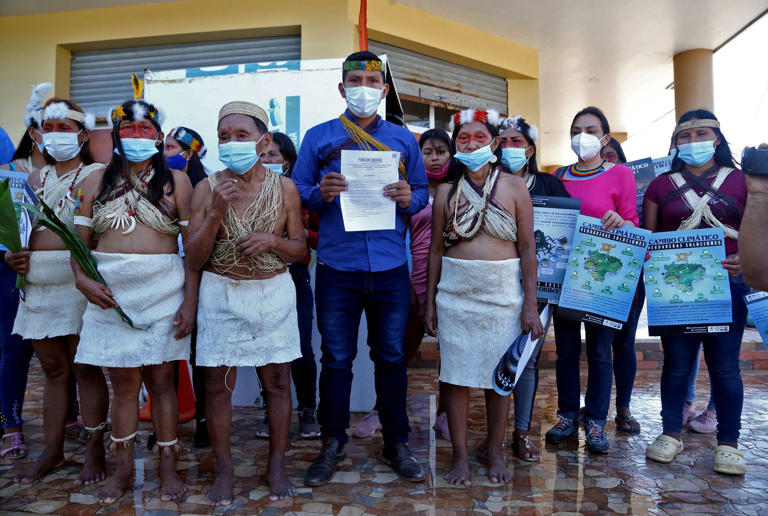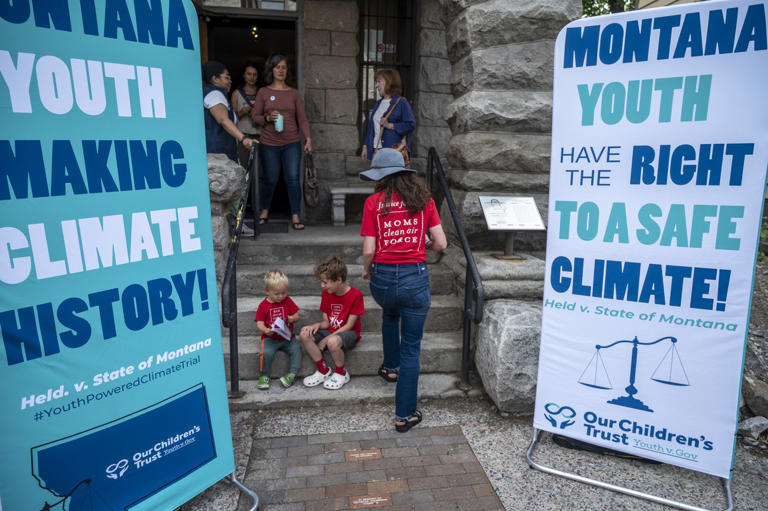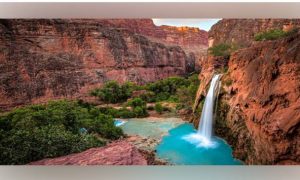Humans now have left undeniable fingerprints on extreme heat, drought, wildfires, and flooding experienced around the world. As these disasters intensify, they push questions the world has grappled with for over 30 years to the forefront: Who is responsible for that damage? And how much they should pay?
Also Read- Putin appeared paralyzed and unable to act in first hours of rebellion
Increasingly, people around the world are trying to settle these questions in the courtroom. A report published Thursday from the UN Environment Programme (UNEP) and the Sabin Center for Climate Change Law at Columbia University puts the global caseload at 2,180 as of the end of 2022, double the number in 2017. This is the third report of its kind, which takes a step back to look at the trends found in the Sabin Center’s database of climate litigation.
The new report notes that not only has there been a steady increase in climate-centered lawsuits in the past five years, but that the diversity of legal strategies has grown as the impacts of climate change have become undeniable. The vast majority of cases, 70 percent, are still in the United States, though the proportion of cases elsewhere in the world is rising.
These kinds of lawsuits are a relatively new phenomenon. Some take a narrower aim to keep a fossil fuel project from developing, or aim to end misleading marketing. Others could carve out new legal precedents. Dozens of cases filed in the US have charged that fossil fuel companies have misled the public on climate science, even crossing the line into organized crime. Around the world, citizens and environmental groups have tried to compel governments to recognize the human rights implications of climate change.
Also Read– Ex-Mossad chief Cohen: Stop the overhaul for the sake of Israel’s national security
The rising tide of litigation was recognized formally last year by the Intergovernmental Panel on Climate Change (IPCC), the most comprehensive climate science body in the world, which noted the importance it plays in confronting questions around how climate change should be governed outside of formal policymaking. The IPCC report also underscores an important reality: Suing will never replace the need for policy and international cooperation, but could supplement it.
Making sense of the impact that climate litigation has had on climate policy is harder than tracking the sheer increase in volume. That’s because climate litigation is a long game, often facing years of appeals and technical hang-ups in courts, even before a decision that could go either way.
Some early themes have emerged, however, that highlight how litigation is helping to advance accountability, unravel disinformation campaigns, and define basic human rights surrounding climate change.
Also Read- How a Third Party Presidential Candidate Could Push Trump to Victory
Climate lawsuits have had an “equalizer effect”
One clear trend in the UNEP report is that climate lawsuits are growing far more diverse, geographically and representationally.
Cases typically are clustered in the United States and Europe, but that is starting to change. More cases in the Global South, where countries will face some of the worst climate impacts while contributing the least to pollution, involve the question of compensation for climate damages. Lawsuits are also expanding to new jurisdictions: Between international and regional courts, tribunals, and quasi-judicial bodies like the Human Rights Committee, the number of jurisdictions hearing cases more than doubled from 2017 to 2022, from 24 to 65.
These lawsuits have become an unexpected way to give people more vulnerable to climate change, including young people, women, and Indigenous people, a voice when they are otherwise left out of public policymaking. The aims of the lawsuits cover vast ground, from asking governments to stop fossil fuel development to demanding compensation for climate damages.

The nonprofit Our Children’s Trust is involved in lawsuits in five countries representing youth plaintiffs who have sued their respective governments to take more aggressive action on climate change. A separate case in Montana is awaiting a decision from a federal district court judge, while a federal case in Oregon, Juliana v. United States, which was first filed in 2015, is finally proceeding to trial.
There are also pending Indigenous cases in Argentina, Australia, Canada, Ecuador, France, New Zealand, and the US, many of which argue that their lands are becoming endangered and uninhabitable.
Women have also played a unique role in litigation, given the evidence that they are disproportionately impacted by climate change. One case, supported by Greenpeace, involves a group of Swiss women over the age of 64, known as the KlimaSeniorinnen Schweiz. They have a complaint before the European Court of Human Rights that asks the court to order Switzerland to pursue more ambitious climate targets, because older populations are more vulnerable to worsening heat waves.
Also Read– S. Korea to support civilian aid to North in hopes of talks
Financial barriers certainly limit just how much private citizens and the environmental groups that represent them can find their voice in the judicial system. But lawsuits still open a pathway to accountability that the opaque annual negotiations through the United Nations and legislative compromise do not.
“It’s an equalizer in a way, because it provides different communities with this opportunity to challenge ambition in climate change action, in ways that at the regular governance level is not possible,” Maria Antonia Tigre, the coauthor of the UNEP report, said in a press briefing. “In that way, it has a very significant role in providing an avenue for climate justice.”
We’re approaching a universal definition of “climate rights”
While past climate cases have often focused narrowly on stopping oil development and spurring government regulation of fossil fuels, a newer class of cases takes a broader look at human rights. They argue that people have inalienable climate rights. Climate rights generally encompass the right to clean food and water and a safe, healthy environment, and were enshrined as UN Human Rights Council (HRC) policy in 2021.
Enforcing these rights is another matter. Plaintiffs have been taking these cases to international courts, the United Nations, and courts domestically.
Also Read– Earth’s inner core may have stopped turning and could go into reverse, study suggests
In the fall of 2022, the HRC found that the Australian government violated the human rights of Indigenous Torres Strait Islanders through climate change inaction, owes compensation, and needs to change course to remedy its inaction (an Australian federal court is also hearing a related case). The decision is nonbinding, so it doesn’t have immediate practical effects on Australia’s international climate pledges, but it calls attention to climate shortcomings and forms the first major international precedent on climate rights, which can impact international policy.
Another important human rights decision came down from the Brazilian Supreme Court last year. It found that the 2015 Paris climate agreement is a human rights treaty, and that it supersedes contradictory domestic laws. The high court found that any Brazilian law or decree that violated the Paris commitment could be invalidated, and that the executive branch has a duty to act on climate change, essentially sending Brazil back to the drawing board to come up with stronger protections for the Amazon rainforest.
Germany had its own version of a human rights case in 2021. The German Federal Constitutional Court struck down parts of the country’s Federal Climate Protection Act as incompatible with human and environmental rights, because it didn’t have sufficient emissions cuts to protect public health. The UNEP report explains: “The court concluded that Germany’s climate law was effectively ‘offloading’ emissions reduction to future generations in a violation of fundamental freedoms.” Germany ultimately passed a new act later that year setting clearer targets for after 2030, though the updated law is also facing a court challenge.
Also Read– Ex-Mossad chief Cohen: Stop the overhaul for the sake of Israel’s national security
For years, countries have failed to match their domestic ambitions with what they pledge internationally through the UN. Leaders often talk a big game on cutting carbon pollution while failing to deliver it in policy (the US, historically the biggest polluter per capita, is the worst offender). The emergence of climate rights as a legal precedent won’t be enough to snap the world to action, but it finally points fingers at culprits of inaction. Some courts are even ordering governments to close this gap.
“These cases across the world have influence and impact that don’t always stay within their national borders,” UNEP coauthor and analyst Andy Raine said.
Lawsuits are establishing a clear record of climate disinformation
Last month, Oregon’s Multnomah County became the latest municipality to sue fossil fuel companies for their role in causing climate change, and misleading the public along the way. The lawsuit centers on the impacts from a 2021 heat dome that settled over the Pacific Northwest, demanding fossil fuel defendants pay $50 million in damages from the event, plus $1.5 billion in future damages and about $50 billion for an abatement fund to upgrade its infrastructure for climate change.
“These businesses knew their products were unsafe and harmful, and they lied about it,” Multnomah County chair Jessica Vega Pederson said. “They have profited massively from their lies and left the rest of us to suffer the consequences and pay for the damages. We say enough is enough.”
There are dozens of cases like this pending in the US. They’ve faced years of delay, but about 20 of them are finally moving forward to discovery and trial, after a federal appeals court last year settled the procedural question of whether they belong in state court. Each of these cases lay out a familiar story using different language and charges.
Also Read- How a Third Party Presidential Candidate Could Push Trump to Victory

The lawsuits accuse Big Oil companies — Exxon, BP, Chevron, ConocoPhillips, Shell, and their lobby group American Petroleum Institute are the usual defendants — of deceiving the public on climate change and working to thwart climate regulation and clean technologies, despite internal documents showing an understanding of the risks of climate change.
As entire states become uninsurable and towns face bankruptcy, more governments are seeking damages from Big Oil for its starring role in the crisis. Puerto Rico has taken another innovative course, suing oil companies using an anti-racketeering law, the Racketeer Influenced and Corrupt Organizations Act (RICO). RICO has previously been used to go after Big Tobacco and organized crime.
Climate activists hope these cases shift both the narrative around climate change and the politics and policy of who pays for the damages. Right now, it’s the individual and taxpayers writ large who bear the full weight of costs, but this could change depending on the outcome of these liability lawsuits.
The cases against Big Oil have proliferated in part because of an evolution in attribution science. Climate scientists can increasingly pinpoint the probability climate change worsened specific extreme weather events, which helps lawyers argue to what degree a company was responsible for a disaster.
There’s a lot riding on the line in these lawsuits, and not just for Big Oil. A rising number of cases are targeting other industries that have worsened climate change, including agriculture and big banks. These industries could see decisions similar to the one Shell faced in 2021, when a Dutch court ordered it to slash its absolute emissions by 45 percent under the Paris agreement. It was the first time a court found a private company to have a duty under the agreement, and notably, the court said Shell is responsible for all the climate pollution that results from its products — like the gasoline burned by driving a car — and not just its industrial operations.
The policy impact of all these cases is still hard to measure. For example, Shell has made no attempt yet to comply with the decision. The company has only boosted its oil production and is appealing the decision. But there are still some measurable impacts. Risk-averse investors have taken notice of the rising tide of lawsuits, and a mass of shareholders have pressured companies to do more.
It also changes the public narrative around climate change. Oil companies “shifted the guilt to people when in fact the guilt belongs to them,” said Richard Wiles, president of the Center for Climate Integrity. “These cases go a long way in helping people understand climate change is not a tragedy. It’s a crime.”
Joana Setzer, a London School of Economics researcher not associated with the UNEP report, has tried to understand the impacts of climate litigation, even if indirect. She used the same Sabin Center database for a London School of Economics snapshot of litigation the past year.
“We can already see [corporations] and governments responding to the risk of litigation,” Setzer told Vox. “We tried to see if there was a direct impact of cases filed and decisions on share prices of major oil companies. We have a working paper that shows that there is a drop in share prices of carbon majors [following decisions].”
Also Read– S. Korea to support civilian aid to North in hopes of talks
Setzer’s research has found that over 50 percent of the cases that have been decided are favorable to climate action. But this is also a new era of climate litigation. “The cases are much more ambitious,” she said. “The decisions deal with national ambition [and] they deal with changing corporate behavior.”





























